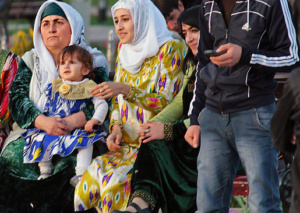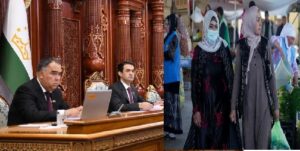Dushanbe, MINA – Apart from banning the hijab for Muslim women, a new law enacted by the Tajikistan Parliament also targets men who maintain thick beards.
According to Atoll Times on Thursday, if Muslimah clothing is prohibited for being considered “foreign to national culture,” then thick beards are banned for being deemed inappropriate.
Men are instructed to keep their facial hair neat. Male students at the country’s only Islamic University are required to wear suits and ties, similar to students at other educational institutions in the country.
After years of unofficial restrictions on religious attire, the Tajikistan government officially banned the wearing of headscarves in the country.
Also Read: Finland’s Largest Retailer Halts Israeli Product Sales
The bill, passed by the lower house of Parliament on May 8 and approved by the upper house on June 19, gives legal weight to President Emomali Rahmon’s stance against “religious extremism.”
Amendments to the “Regulation of Festivities and Ceremonies Act” prohibit the “import, sale, promotion, and use of clothing deemed foreign to national culture.”
At the core of these changes is the ban on the hijab, a head covering worn by Muslim women, as well as other garments associated with Arab culture.
This decision has sparked much speculation within Muslim communities worldwide, with some approving and others disagreeing.
Also Read: 1,000th Western Military Supply Plane Lands in Israel Since Gaza War
Bordering Afghanistan, Rahmon seeks to ban the hijab in a country where 96% of the population is Muslim.
The law is part of President Rahmon’s broader efforts to promote what he views as “Tajik” culture and minimize the visibility of religious practices in society.
Rahmon has been in power since 1994, making his 30-year tenure one of the longest in the region. Early in his career, he opposed more religious political parties and has a history of opposing certain aspects of Arab culture.
In 2015, he referred to the hijab as a “sign of poor education.” In 2018, the government even published a manual titled ‘Recommended Dress Code Book in Tajikistan’ and formed a special commission to oversee “appropriate” clothing rules for men and women. (T/RE1/P2)
Also Read: Trump to Meet with NYC Mayor-Elect Mamdani at White House on Friday
Mi’raj News Agency (MINA)











![Israeli tanks and APC’s gather by the Israeli – Lebanese border. Amid Israel’s escalating campaign against Hezbollah in Lebanon on September 30, 2024. [Erik Marmor/Getty Images]](https://en.minanews.net/wp-content/uploads/2024/10/IMG_20241001_203226-300x197.jpg)























 Mina Indonesia
Mina Indonesia Mina Arabic
Mina Arabic